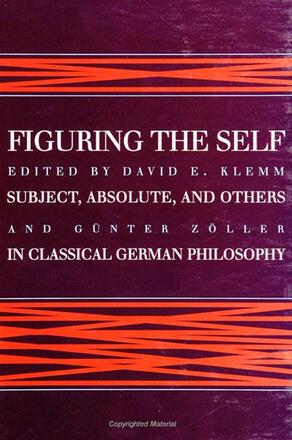
Figuring the Self
Subject, Absolute, and Others in Classical German Philosophy
Alternative formats available from:
Provides a systematic overview of the topic of self in classical German philosophy, focusing on the period around 1800 and covering Kant, Fichte, Holderlin, Novalis, Schelling, Schleiermacher, and Hegel.
Description
Figuring the Self consists of twelve essays which present, discuss, and assess the principal accounts of the self in classical German philosophy, focusing on the period around 1800 and covering Kant, Fichte, Hölderlin, Novalis, Schelling, Schleiermacher, and Hegel.
David E. Klemm is Professor of Religion at the University of Iowa. He is the author of The Hermeneutical Theory of Paul Ricoeur: A Constructive Analysis; editor and commentator of Hermeneutical Inquiry, Volume 1: Interpretation of Texts; Volume 2: Interpretation of Existence; and coeditor of Meaning in Texts and Actions: Questioning Paul Ricoeur. Günter Zöller is Professor and Chair of Philosophy at the University of Iowa. He is the author of Theoretische Gegenstandsbeziehung bei Kant (Objective Reference in Kant) and Original Duplicity: Intellect and Will in Fichte's Transcendental Philosophy (1794-1800); coeditor of Minds, Ideas, and Objects: Essays in the Theory of Representation in Modern Philosophy; and editor of The Cambridge Companion to Fichte.
Reviews
"This collection of speculative, critical, and expository essays succeeds in presenting a representative array of the various philosophical approaches to the self among German idealists. The survey makes clear the density and diversity of the reflection on the self during this period. In addition, some essays identify the significance of a particular approach for contemporary debates, while others elucidate how specific philosophers of a later generation take their bearings from the insights of German idealists." — Daniel O. Dahlstrom, Catholic University of America
"The contributors are correct in their view that this takes up a subject that has been overlooked in studies of German Idealism, that is, there are discussions of the self in Hegel, but not traced out in the whole movement of German Idealism. The self is a topic in philosophy that needs more attention. These are original treatments on the subject and the book is itself insightful in bringing together essays on all of the major figures in this period of philosophy." — Donald Phillip Verene, Candler Professor of Metaphysics and Moral Philosophy, Emory University
"The range of interests represented in this book make it exemplary. It is hard to imagine a philosopher who would not find something of interest here, because the contributors, while reflecting scholarly concerns, are not inhibited by them from addressing topics of contemporary relevance." -- Robert Bernasconi, The University of Memphis